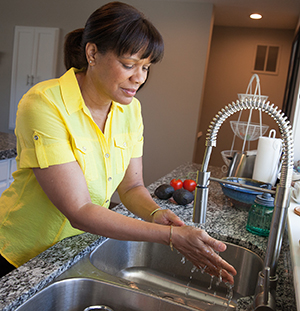Skin problems are common side effects of chemotherapy. They can be minor changes or can be more severe, needing your healthcare provider's attention. These side effects occur because the treatment affects normal cells as well as cancer cells. To manage these side effects, try these tips.
Use mild products
-
Ask your healthcare team what kind of products are best to use on your skin.
-
Use unscented soaps and facial cleansers.
-
Use unscented laundry detergent.
-
Don't use acne products. These can make skin symptoms worse. These include products with alpha or beta hydroxy acids, retinoids, or benzoyl peroxide.
-
Don't use skin products that contain alcohol. This includes face cleansers, lotions, perfumes, and aftershaves.
Be gentle
-
Bathe and wash your hands with warm or cool water, not hot.
-
Take short showers or sponge baths.
-
Don’t scrub–wash gently and pat dry.
-
Apply a water-based, unscented cream or lotion on your skin as soon as possible after you bathe or wash your hands.
-
Wear gloves to protect your hands when doing yard work or cleaning.
Limit sun exposure
-
Stay out of direct sun as much as you can, especially during the time of day when the sun is overhead and most intense (10 a.m. to 4 p.m.).
-
Use a broad-spectrum sunscreen with SPF 30 or higher if you go outside. Reapply every 2 hours, or more often if sweating or swimming.
-
Wear a hat and other clothing such as a long-sleeved shirt and pants to cover your skin if you go outside.
Stay comfortable
-
Wear comfortable, loose-fitting clothing and shoes.
-
Wear cotton instead of fabrics that can irritate, such as wool, linen, or synthetics.
-
Put padded insoles into your shoes and make sure your shoes aren't too tight.
-
Wear gloves and socks to prevent injury to the skin on your hands and feet.
When to call your healthcare provider
Call your healthcare provider right away if any of these occur:
-
Rash, itching, or hives
-
Skin near a cut or rash swells, turns red, feels hot or painful, or begins to ooze
Featured in


